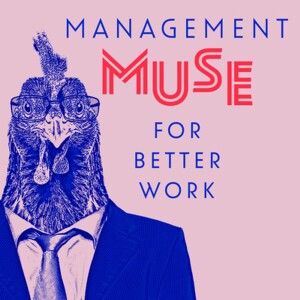
Tuesday May 10, 2022
EP10 Deception: Can Lying Be Good? Matt McGlone Makes the Case
To lie or not to lie, that is today’s question. Deception isn’t always a bad thing—you probably don’t tell your significant other everything.There’s a difference between outright lies—almost always counterproductive and bad—and selective deception, which is not saying something. Sometimes, a little selective deception is a smart management strategy. After all, that’s what having trade secrets is all about. Today's guest on Management Muse, Professor Matthew McGlone, is here to tell us more.
The key to leveraging deception in business is to focus on the good, like your good reviews, your successes, and your happy customers. Impression management and selective representation can be a very useful skill for businesses managing their public image.
The danger, however, comes when what you are not saying is more important than what you are saying.
You can still be authentic and mostly honest while using selective deception. Most people tell the truth most of the time. Used sparingly, and without outright lies, selective deception might be a smart occasional choice. In today’s episode, we dive deep into deception.
Timestamps:
[3:04] When deception in management is a positive tool [6:46] Avoiding deception pitfalls [9:36] Managing your company’s public impression
[13:10] Authenticity versus falsehood
[16:39] Self-deception to continue to see ourselves in a good light
[21:48] Why you shouldn’t be too hard on yourself for deceiving
[28:00] Differences in groups (females/males) in lying [37:48] Detecting lies, maybe
Episode Quotes:
“Why should organizations which consist of people be any different than the individual who tries to put their best face forward? And so, in that sense, I think that deception can be very useful. I'd say that it is sort of skill. Any sort of impression management selective representation would be very important for a manager. “– Matt McGlone
“Astroturfing is when companies will put their campaigns and efforts to engage in sustainable, clean technology. They'll put that in the forefront while not talking about the fact that there are major pollutants. That's why astroturfing is a wonderful word. It looks like grass. But it really isn't. It's as toxic and plastic and artificial as it can be.”– Matt McGlone
“We're generally truth tellers, and so the four things that I remember you saying are to go easy on yourself, try not to lie outright, think about the relationship, and then consider being extremely forgiving of other people when you catch them [in a lie].” – Geoffrey Tumlin
“I’ve always thought that organizations get hung up when they make their identity about like a core value, and then that's the thing that they wind up doing something contradictory towards, whether it's lying or just an overt act.”– Cindi Baldi
“Used in a very misleading way, and that's there's a phenomenon people called paltering. Paltering is when you say things that are truthful, and they are every bit as misleading as a falsehood. I would urge managers to think about how much paltering might be going on in there. In their organizations because I think misleading truths is an overlooked category.” – Matt McGlone
Resources:
McGlone, Matthew S., and Mark L. Knapp. "Historical perspectives on the study of lying and deception." The Palgrave Handbook of Deceptive Communication. Palgrave Macmillan, Cham, 2019. 3-28.
McGlone, Matthew S., and Mark L. Knapp, eds. The interplay of truth and deception. New York, NY: Routledge, 2010.
www.managementmuse.com
https://ondemandleadership.com/executive-team-building/
https://culsure.com/product/organizational-benchmark/
No comments yet. Be the first to say something!